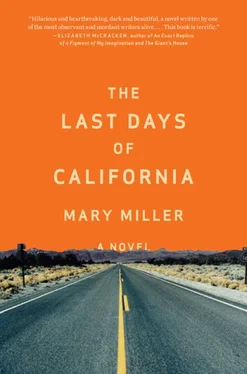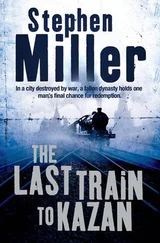“What schedule?” she asked.
“You know what schedule,” I said. “California.”
“I’m still not sure why we’re going there,” Elise said. “Why are we going there?”
“You know why,” I said.
“Remind me.”
“Because that’s where Marshall is,” I said.
“It’s not like we’re going to meet him.”
“We might,” I said.
“That’s not the reason we’re going to California,” our father said.
“Then why are we going?” Elise asked.
“Because it’s in Pacific Time,” I said.
“I’m not asking you . I’m asking Dad .”
“We’re preparing,” I said.
“Shut up, Jessica,” she said. Nobody called me Jessica. I didn’t like the sound of it. It had too many syllables. “Dad?”
“We’re on a pilgrimage,” he said calmly, but his ears and neck were red and he was shaking.
I watched him fade back to his normal color and thought about how he’d sold the trip to us in the first place. We were at home, eating my mother’s meatloaf and my father’s cornbread, when he’d pitched the idea: a pilgrimage to California. We didn’t need a caravan—we could be our own caravan. And hadn’t we always wanted to see the country? I’d wanted to go to Disney World as a kid, and I’d wanted to see some caves once, after watching a program about Mammoth Cave, but we only went to Destin year after year because one of my mother’s sisters had a condo there.
As the trip had been over a month away, I agreed easily. It was easy to agree to things when nothing was required of me at the moment, or in the very near future. I regretted it later, of course, when getting out of the thing I had agreed to was much more difficult than not having agreed to it in the first place, but I knew this wasn’t like that. If my father wanted to go to California, we would go. If he wanted a pilgrimage, we would be his pilgrims. Our mother reminisced about a cross-country trip she had taken as a child. It was a story I’d heard many times, all centering around one bathroom stop in which her father had embarrassed them, and the geysers at Yellowtsone. It was like she had no memory at all, like she’d taken photographs so there’d be no need to recall the actual event. Elise was the only one to resist, saying she had cheerleading practice and might need to retake a class. When that didn’t persuade him, she said, “ The last shall be first and the first shall be last, ” but this seemed to strengthen his argument. We would wait our turns, he said.
I looked out the window. There was no grass, no trees. My father drove faster and faster, the land so barren it was easy to imagine the world had already ended and we hadn’t heard.
“These are some of the least populated counties in the country,” our father said, breaking the silence.
Elise’s phone beeped and she smiled at it. Then she leaned over and said, “Dan dropped his phone in the lake. He had to get a new one.”
“I told you,” I said, though it didn’t explain why he hadn’t emailed her, or why he hadn’t borrowed someone else’s phone to call her. Any one of his friends would have had her number.
She touched her hair, as if to remind herself she was beautiful.
“I told you he wasn’t in a ditch.” I scratched at my tiger face, getting yellow paint in my fingernails. “Which lake?”
“I don’t know which lake ,” she said, and stopped typing to give me a dirty look.
They spent the next half-hour texting. I wanted to text someone but no one was expecting to hear from me. I had friends but they were mostly school or church friends. We didn’t play with each other’s hair or tell each other our deepest secrets. It wasn’t at all what I’d thought junior high friends would be like—I thought we’d be sleeping in the same bed, shopping for clothes. I thought we’d tell each other everything. I knew it was my own fault. When someone lightly touched my arm or leg while we were talking, I flinched. I didn’t know how I could want things so badly while making it impossible to ever get them.
In Valentine, we insisted on stopping so we could get a snack.
I went to the bathroom—my tiger was all smeared and there were little trails of flesh peeking out. I washed it off, the paint leaving behind a sticky yellow film.
I bought a package of gummy bears—250 calories, no fat—and Elise bought a bag of popcorn, a giant pickle, and a Sprite. She never drank Sprite because it had a lot of calories, and I took it as a sign that she was starting to think about the baby.
“A little old for face-painting, aren’t you?” the man behind the register asked Elise.
“I still trick-or-treat, too,” she said.
I thought about Elise’s Halloween costumes: she was always a dead slutty something, same as her friends. She seemed too cool to be a dead slutty something but she wasn’t.
Back in the car, I ate all of the red gummy bears first, followed by the orange and yellow, and then the white and green. I poked my mother and dropped my empty wrapper into her lap. She opened her eyes and turned to me.
“Do you have a headache?” I asked. She liked to call them cluster headaches because it made them sound more ominous. She said they were very serious and that more than 20 percent of the people who got them killed themselves.
“I’m just resting,” she said. “I didn’t sleep well last night.”
“Me either.”
“I’m sorry,” she said, squeezing my hand.
We usually stopped by four o’clock, but my father drove past four o’clock and past five o’clock. We grew antsy, counting down the miles to towns that quickly came and went. Finally, he took an exit for a rest station.
We got out and stretched, looked around. The vending machines were protected by bars.
“Not even the vending machines are safe here,” I said, but no one laughed. The rest stop was pretty nice, actually—the lawn was freshly mowed and there was a fountain. People walked their dogs.
My mother, Elise, and I went into the bathroom.
“Men have sex in rest-stop bathrooms,” Elise said. “I read an article. They call them something—I forget what they call them.”
“You’re always filling your mind with trash,” our mother said. “If you fill your mind with trash, that’s what you’ll think about.”
“You mean if you fill your mind with trash, you’ll be trash,” I said. I was in the middle stall, could see their feet on either side.
“That’s not what I mean,” my mother said.
“That’s exactly what you mean,” said Elise. “You think we’re trash.”
“Don’t bring me into it,” I said. “I’m not trash.”
Our mother got her feelings hurt, said we were always assuming things, putting words into her mouth.
Elise and I bought Cokes at the vending machines and sat beside the fountain, tapping our flip-flops on the water. First she’d tap, making ripples, and then I’d tap. When we grew tired of that, we made wishes. We tossed in our pennies first, one at a time, and then our nickels, dimes, and quarters.
“Van Horn’s coming up,” our father said, walking up behind us. “We’ll stop there.”
“That sounds like a good place,” I said for something to say. So much of what he said required no response, but if no one said anything, his words just hung there. He gave us the coins from his pockets and we threw those in, too, but after a while I realized I’d stopped wishing and was just throwing.
Van Horn, Texas, was a tiny dot on the map.
Our father pulled into the crappiest motel we’d stayed in yet, sprawling and one-story, painted in hospital blues and greens.
“Things are steadily going downhill for this family,” Elise said. This struck us as funny and we laughed.
Читать дальше












